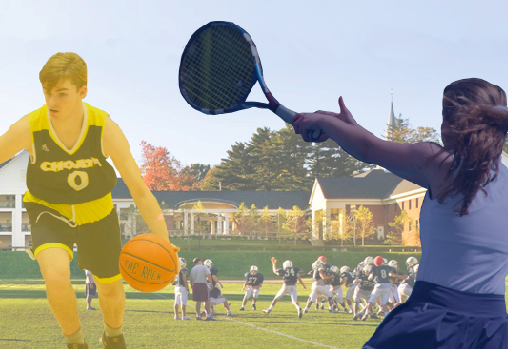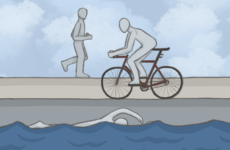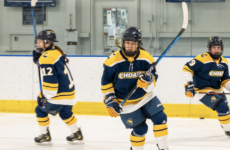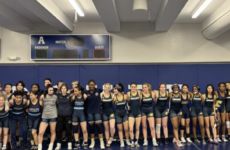Choate’s campus is filled with talented students. Each individual is passionate about sports, academics, arts or one of many other aspects that make-up the Choate community. One identity that many Choate students can relate to is the idea of being a “student-athlete”. This term can be interpreted in many ways. For instance, some may say that “student-athletes” is directed towards anyone who can play a sport at some intensive level, while handling rigorous academics. Others may be subjected in saying that student-athletes are only people on varsity sports. Except, at Choate, anyone who plays a sport at some level of intensity or competition should be considered a “student-athlete”.
Isabelle So ’20 got the opportunity to interview five juniors at Choate who are currently involved with not only a signature academic program, but also one or multiple varsity sports. Vincenzo DiNatale ’19 is one of the few students who was part of three varsity sports: swimming, cross country and track. He studied abroad in Spain before his junior year and is currently a member of the Student Research Program(SRP). Aaron Lake ’19 played varsity soccer and is currently studying abroad in Spain. Lani Uyeno ’19 was the libero for varsity volleyball in the fall and is currently a member of SRP. Hannah Huddleston ’19 is a varsity soccer player and plays JV hockey and ultimate frisbee. She also lives at the Kohler Environmental Center (KEC). Lastly, Parth Mody ’19 is a member of varsity tennis, cross-country, and SRP.
Along with the rigor from Choate’s academics, these student-athletes have also had to make sacrifices to keep up with their sports. According to DiNatale, when he went to study abroad last summer in Spain, it was hard for him to continue swimming. After spending months out of the water, he was extremely out of shape. At the start of the swim season he was far behind and it was hard for him to progress during the season. Also, he had to give up track in the spring due to the time necessary for SRP and other academic commitments. On the other hand, Mody said that due to the time commitments and long practices, he has had to participate in fewer clubs.
When balancing between sports and academics, one must make a decision and focus on one more so than the other. Mody said, “Definitely academics. I don’t have a chance of going D1 or even D2 for either XC or tennis. So, I know academics is most likely what will get me into college. Also, academics will be much more useful to me in college and afterwards since I won’t be playing a sport professionally.” Lake shared a similar sentiment, saying that he focuses on academics primarily because he is not planning on going pro and academics will get him farther in life. Uyeno also said, “Academics always come first for me because I know that I will not be playing volleyball at a professional level. Therefore, I need strong academics to get me a job in the future.” In general, most student-athletes tend to drift towards academics rather than sports, unless they decide and hope to go professional.
Now other aspects of life at Choate need to be dropped or sacrificed because of the priority these students place on academics and athletics. For instance, Uyeno, by prioritizing sports and academics, has had to sacrifice her social life to an extent. She did not have the flexibility to spend time with her friends as much as she wanted to because she was always doing her work when she was not at volleyball practice. On the other hand, Mody knew what he was getting into and it was going to be hard to juggle both, so he had to sacrifice his possible athletic future. Huddleston had to sacrifice her love of music due to sports and academics. The ensembles at Choate meet during the night and since she spent many hours at club soccer, she did not have the time to continue her music career.
Obviously, at times, students tend to find difficulties with time management or keeping up with work. Uyeno says that sports have helped her work on her time management. Playing since a young age, she does not have any difficulty planning when to do her work and when to go to practices. She is always ahead on her work, doing it in advance over break or earlier in the week, so when she comes back to campus, she is not swamped with work. On a similar note Huddleston said, “Playing sports has definitely helped me with time management. One spring when I was younger my parents signed me up for four teams at the same time, so I was always really busy. I got used to eating dinner and doing homework in the car on the way to practice. It has helped me do work more efficiently and find times during the day to get it done.” Lake mentioned that his grades tend to be better outside of soccer season because he has more time and more energy to do his work, but during the season they aren’t that bad. Adding on, DiNatale stated, “I haven’t struggled with time management too much. When I do have meets on the weekends, I find that I have to get ahead on work on Fridays. When I have meets during the week, I have to get ahead on the weekends. I was really fortunate with SRP because the program allows me to get ahead as much as I need to. ” Mody also mentioned that his coaches have played a huge role in time management. He hasn’t had any major conflicts yet, but there could be when he is in labs most of the summer for SRP and unable to train.
One of the most important aspects of being a student-athlete is the dealing with the high expectations. There is this idea that some recruits are not as smart or don’t work as hard as a normal student. In reality, due to Choate’s rigorous academics, many athletes work even harder as they need to balance their academics, their extracurricular activities, and their sports. DiNatale stated that student-athletes shouldn’t have it easier just because they are involved in multiple activities. To back up that claim, Lake mentioned, “Everyone at Choate does something in addition to school. So, to me academics are no harder for student-athletes than for someone in Arts Con or the musical.”
Finally, some words of wisdom for the other student-athletes on Choate’s campus, DiNatale wants to remind others to “make sure they manage their time well. If you want to balance both the demanding academic workload and a high-intensity sport, time management is key.” According to Uyeno, “being a student-athlete is more fun. Winning championships and making lifelong friends with teammates make it all worthwhile.” Lastly, Huddleston said, “It’s important to find the things you’re passionate about at Choate and make time for them.”
Overall, being a student-athlete means having good time management, prioritizing what you do, having a balance in your lifestyle, and enjoying what you do. Every Choate student has extracurricular activities they are passionate about, but the group that defines themselves as “student-athletes” plays a huge role in making Choate’s community the way it is.





